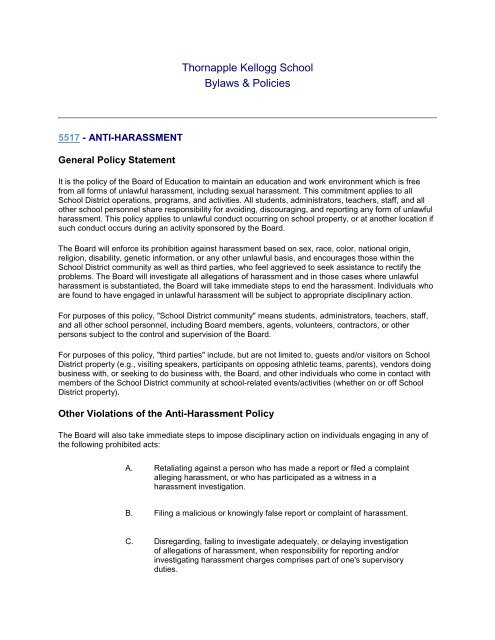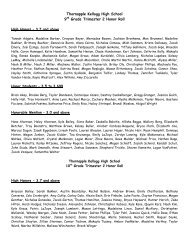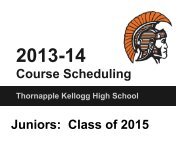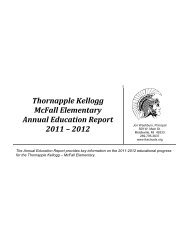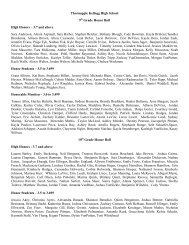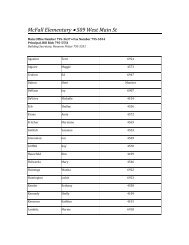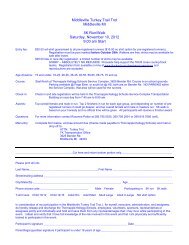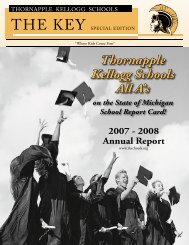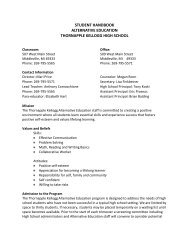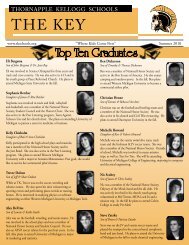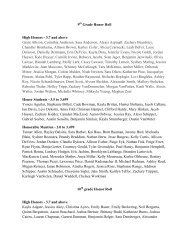5517 Anti Harassment Policy - Thornapple-Kellogg Schools
5517 Anti Harassment Policy - Thornapple-Kellogg Schools
5517 Anti Harassment Policy - Thornapple-Kellogg Schools
You also want an ePaper? Increase the reach of your titles
YUMPU automatically turns print PDFs into web optimized ePapers that Google loves.
<strong>Thornapple</strong> <strong>Kellogg</strong> School<br />
Bylaws & Policies<br />
<strong>5517</strong> - ANTI-HARASSMENT<br />
General <strong>Policy</strong> Statement<br />
It is the policy of the Board of Education to maintain an education and work environment which is free<br />
from all forms of unlawful harassment, including sexual harassment. This commitment applies to all<br />
School District operations, programs, and activities. All students, administrators, teachers, staff, and all<br />
other school personnel share responsibility for avoiding, discouraging, and reporting any form of unlawful<br />
harassment. This policy applies to unlawful conduct occurring on school property, or at another location if<br />
such conduct occurs during an activity sponsored by the Board.<br />
The Board will enforce its prohibition against harassment based on sex, race, color, national origin,<br />
religion, disability, genetic information, or any other unlawful basis, and encourages those within the<br />
School District community as well as third parties, who feel aggrieved to seek assistance to rectify the<br />
problems. The Board will investigate all allegations of harassment and in those cases where unlawful<br />
harassment is substantiated, the Board will take immediate steps to end the harassment. Individuals who<br />
are found to have engaged in unlawful harassment will be subject to appropriate disciplinary action.<br />
For purposes of this policy, "School District community" means students, administrators, teachers, staff,<br />
and all other school personnel, including Board members, agents, volunteers, contractors, or other<br />
persons subject to the control and supervision of the Board.<br />
For purposes of this policy, "third parties" include, but are not limited to, guests and/or visitors on School<br />
District property (e.g., visiting speakers, participants on opposing athletic teams, parents), vendors doing<br />
business with, or seeking to do business with, the Board, and other individuals who come in contact with<br />
members of the School District community at school-related events/activities (whether on or off School<br />
District property).<br />
Other Violations of the <strong>Anti</strong>-<strong>Harassment</strong> <strong>Policy</strong><br />
The Board will also take immediate steps to impose disciplinary action on individuals engaging in any of<br />
the following prohibited acts:<br />
A. Retaliating against a person who has made a report or filed a complaint<br />
alleging harassment, or who has participated as a witness in a<br />
harassment investigation.<br />
B. Filing a malicious or knowingly false report or complaint of harassment.<br />
C. Disregarding, failing to investigate adequately, or delaying investigation<br />
of allegations of harassment, when responsibility for reporting and/or<br />
investigating harassment charges comprises part of one's supervisory<br />
duties.
Definitions<br />
Sexual <strong>Harassment</strong><br />
Pursuant to Title VII of the Civil Rights Act of 1964 and Title IX of the Educational Amendments of 1972,<br />
"sexual harassment" is defined as:<br />
Unwelcome sexual advances, requests for sexual favors, and other verbal or physical conduct of a sexual<br />
nature, when:<br />
A. Submission to such conduct is made either implicitly or explicitly a term<br />
or condition of an individual's employment, or status in a class,<br />
educational program, or activity;<br />
B. Submission or rejection of such conduct by an individual is used as the<br />
basis for employment or educational decisions affecting such individual;<br />
C. Such conduct has the purpose or effect of interfering with the<br />
individual's work or educational performance; of creating an<br />
intimidating, hostile, or offensive working, and/or learning environment;<br />
or of interfering with one's ability to participate in or benefit from a class<br />
or an educational program or activity.<br />
Sexual harassment may involve the behavior of a person of either gender against a person of the same<br />
or opposite gender.<br />
Prohibited acts that constitute sexual harassment may take a variety of forms. Examples of the kinds of<br />
conduct that may constitute sexual harassment include, but are not limited to:<br />
A. Unwelcome sexual propositions, invitations, solicitations, and flirtations.<br />
B. Physical assault.<br />
C. Threats or insinuations that a person's employment, wages, academic<br />
grade, promotion, classroom work or assignments, academic status,<br />
participation in athletics or extra-curricular programs or events, or other<br />
conditions of employment or education may be adversely affected by not<br />
submitting to sexual advances.<br />
D. Unwelcome verbal expressions of a sexual nature, including graphic<br />
sexual commentaries about a person's body, dress, appearance, or<br />
sexual activities; the unwelcome use of sexually degrading language,<br />
jokes or innuendoes; unwelcome suggestive or insulting sounds or<br />
whistles; obscene telephone calls.<br />
E. Sexually suggestive objects, pictures, videotapes, audio recordings or<br />
literature, placed in the work or educational environment, which may<br />
embarrass or offend individuals.
F. Unwelcome and inappropriate touching, patting, or pinching; obscene<br />
gestures.<br />
G. A pattern of conduct, which can be subtle in nature, that has sexual<br />
overtones and is intended to create or has the effect of creating<br />
discomfort and/or humiliation to another.<br />
H. Remarks speculating about a person's sexual activities or sexual history,<br />
or remarks about one's own sexual activities or sexual history.<br />
I. Inappropriate boundary invasions by a District employee or other adult<br />
member of the School District community into a student's personal<br />
space and personal life.<br />
Not all behavior with sexual connotations constitutes unlawful sexual harassment. Conduct must be<br />
sufficiently severe, pervasive, and persistent such that it adversely affects an individual's employment or<br />
education, or such that it creates a hostile or abusive employment or educational environment.<br />
NOTE: Sexual conduct/relationships with students by District employees or any<br />
other adult member of the School District community is prohibited, and any<br />
teacher, administrator, coach, or other school authority who engages in sexual<br />
conduct with a student may also be guilty of the criminal charge of "sexual<br />
battery". The issue of consent is irrelevant in regard to such criminal charge<br />
and/or with respect to the application of this policy to District employees or other<br />
adult members of the School District community.<br />
Race/Color <strong>Harassment</strong><br />
Prohibited racial harassment occurs when unwelcome physical, verbal, or nonverbal conduct is based<br />
upon an individual's race or color and when the conduct has the purpose or effect of interfering with the<br />
individual's work or educational performance; of creating an intimidating, hostile, or offensive working,<br />
and/or learning environment; or of interfering with one's ability to participate in or benefit from a class or<br />
an educational program or activity. Such harassment may occur where conduct is directed at the<br />
characteristics of a person's race or color, such as racial slurs, nicknames implying stereotypes, epithets,<br />
and/or negative references relative to racial customs.<br />
Religious (Creed) <strong>Harassment</strong><br />
Prohibited religious harassment occurs when unwelcome physical, verbal, or nonverbal conduct is based<br />
upon an individual's religion or creed and when the conduct has the purpose or effect of interfering with<br />
the individual's work or educational performance; of creating an intimidating, hostile, or offensive working<br />
and/or learning environment; or of interfering with one's ability to participate in or benefit from a class or<br />
an educational program or activity. Such harassment may occur where conduct is directed at the<br />
characteristics of a person's religious tradition, clothing, or surnames, and/or involves religious slurs.<br />
National Origin <strong>Harassment</strong><br />
Prohibited national origin harassment occurs when unwelcome physical, verbal, or nonverbal conduct is<br />
based upon an individual's national origin and when the conduct has the purpose or effect of interfering<br />
with the individual's work or educational performance; of creating an intimidating, hostile, or offensive<br />
working and/or learning environment; or of interfering with one's ability to participate in or benefit from a<br />
class or an educational program or activity. Such harassment may occur where conduct is directed at the
characteristics of a person's national origin, such as negative comments regarding customs, manner of<br />
speaking, language, surnames, or ethnic slurs.<br />
Disability <strong>Harassment</strong><br />
Prohibited disability harassment occurs when unwelcome physical, verbal, or nonverbal conduct is based<br />
upon an individual's disability and when the conduct has the purpose or effect of interfering with the<br />
individual's work or educational performance; of creating an intimidating, hostile, or offensive working<br />
and/or learning environment; or of interfering with one's ability to participate in or benefit from a class or<br />
an educational program or activity. Such harassment may occur where conduct is directed at the<br />
characteristics of a person's disabling condition, such as negative comments about speech patterns,<br />
movement, physical impairments or defects/appearances, or the like. Such harassment may further occur<br />
where conduct is directed at or pertains to a person's genetic information.<br />
Reports and Complaints of Harassing Conduct<br />
Members of the School District community and third parties are encouraged to promptly report incidents<br />
of harassing conduct to an administrator, supervisor or other School District official so that the Board may<br />
address the conduct before it becomes severe, pervasive, or persistent.<br />
Members of the School District community or third parties who believe they have been unlawfully<br />
harassed by another member of the School District community or a third party are entitled to utilize the<br />
Board's complaint process. Initiating a complaint, whether formally or informally, will not adversely affect<br />
the complaining individual's employment or participation in educational or extra-curricular programs.<br />
While there are no time limits for initiating complaints of harassment under this policy, individuals should<br />
make every effort to file a complaint as soon as possible after the conduct occurs while the facts are<br />
known and potential witnesses are available.<br />
The names and titles of the <strong>Anti</strong>-<strong>Harassment</strong> Complaint Coordinators with whom complaints of sexual<br />
and other forms of unlawful harassment should be filed are set forth in the administrative guidelines that<br />
supplement this policy. The names and titles of these individuals will be published annually in the District<br />
newsletter.<br />
The Superintendent shall establish administrative guidelines describing both a formal and an informal<br />
process for making a charge of harassment, a process for investigating claims of harassment, and a<br />
process for rendering a decision regarding whether the claim of harassment was substantiated. This<br />
policy and the administrative guidelines will be readily available to all members of the School District<br />
community and posted in appropriate places throughout the School District.<br />
Any Board employee who directly observes unlawful harassment of a student is obligated, in accordance<br />
with this policy, to report such observations to one of the Complaint Coordinators. Thereafter, the<br />
Complaint Coordinator must contact the student, if age eighteen (18) or older, or the student's parents if<br />
under the age eighteen (18), to advise s/he/them of the Board's intent to investigate the alleged<br />
misconduct, including the obligation of the Complaint Coordinator or designee to conduct an investigation<br />
following all the procedures outlined for a formal complaint.<br />
Privacy/Confidentiality<br />
The School District will respect the privacy of the complainant, the individual(s) against whom the<br />
complaint is filed, and the witnesses as much as possible, consistent with the Board’s legal obligations to<br />
investigate, to take appropriate action, and to conform with any discovery or disclosure obligations. All<br />
records generated under the terms of this policy and its related administrative guidelines shall be<br />
maintained as confidential to the extent permitted by law.
Informal Process for Addressing Complaints of <strong>Harassment</strong><br />
The administrative guidelines will include an informal complaint process to provide members of the<br />
School District community or third parties who believe they are being unlawfully harassed with a range of<br />
options designed to bring about a resolution of their concerns. Members of the School District community<br />
or third parties who believe that they have been unlawfully harassed may initiate their complaint through<br />
this informal complaint process, but are not required to do so. The administrative guidelines will include<br />
as a requirement the prerequisite that the informal process is only available in those circumstances where<br />
the parties (alleged target of harassment and alleged harasser(s)) agree to participate in the informal<br />
process. Those members of the School District community or third parties who believe that they have<br />
been unlawfully harassed may proceed immediately to the formal complaint process and individuals who<br />
seek resolution through the informal procedure may request that the informal process be terminated at<br />
any time to move to the formal complaint process. However, all complaints of harassment involving a<br />
District employee or any other adult member of the School District community against a student will be<br />
formally investigated.<br />
Formal Process for Addressing Complaints of <strong>Harassment</strong><br />
The administrative guidelines will also include a formal complaint process. While the formal complaint<br />
process may serve as the first step to resolution of a charge of unlawful harassment, it is also available in<br />
those circumstances when the informal complaint process fails to satisfactorily resolve a concern.<br />
Because of the need for flexibility, no specific time lines are established for initiating the formal complaint<br />
process; however, once the formal complaint process is begun, the investigation will be completed in a<br />
timely manner (ordinarily, within thirty-one (31) calendar days of the complaint being received).<br />
Members of the School District community or third parties who feel they have been unlawfully harassed<br />
should file a formal written complaint with the principal of their school building or with one of the<br />
Complaint Coordinators identified in the administrative guidelines. Oral complaints of harassment will be<br />
reduced to writing by the individual receiving the complaint and the Complainant will be asked to verify<br />
the accuracy of the reported charge by signing the document. Complaints received by a school building<br />
principal will be immediately reported to the appropriate Complaint Coordinator identified in the<br />
administrative guidelines.<br />
After a complaint is filed, the Complaint Coordinator or designee shall conduct a prompt and timely<br />
investigation. The investigation may include interviews of the complainant, the individual accused of<br />
engaging in harassing behavior, and any other witness who may reasonably be expected to have<br />
information relevant to the situation. All interviewed parties and witnesses will be provided an opportunity<br />
to present any evidence that they reasonably believe to be relevant to the situation.<br />
At the conclusion of the investigation the Complaint Coordinator or designee will prepare and deliver to<br />
the Superintendent a written report summarizing the evidence gathered during the investigation and<br />
providing his/her recommendations regarding whether or not the complaint of unlawful harassment has<br />
been substantiated. The written report must be based on the totality of the circumstances involved in the<br />
complaint, the nature of the alleged conduct, the context in which the alleged conduct occurred, and the<br />
ages and maturity of the individuals involved.<br />
Upon review of the written report the Superintendent will either issue a final decision regarding whether or<br />
not the complaint of unlawful harassment was substantiated, or request that further investigation be<br />
conducted. A copy of Superintendent's action will be delivered to both the Complainant and the individual<br />
accused of the harassing conduct.<br />
The decision of the Superintendent shall be final.<br />
The Complaint process set forth in the policy and in the administrative guidelines is not intended to<br />
interfere with the rights of a member of the School District community or a third party to pursue a
complaint of unlawful harassment with the United States Department of Education, Office for Civil Rights,<br />
the Ohio Civil Rights Commission, or the Equal Employment Opportunity Commission.<br />
The Board reserves the right to investigate and resolve a complaint or report of unlawful harassment<br />
regardless of whether the member of the School District community or third party alleging the harassment<br />
pursues the complaint. The Board also reserves the right to have the formal complaint investigation<br />
conducted by an external person in accordance with this policy and administrative guidelines or in such<br />
other manner as deemed appropriate by the Board or its designee.<br />
Sanctions and Monitoring<br />
The Board shall enforce its prohibitions against unlawful harassment. While observing the principles of<br />
due process, a violation of this policy may result in disciplinary action up to and including the discharge of<br />
an employee or the suspension/expulsion of a student. All disciplinary action will be taken in accordance<br />
with applicable State law and the terms of the relevant collective bargaining agreement(s). When<br />
imposing discipline, the Superintendent shall consider the totality of the circumstances involved in the<br />
matter, including the ages and maturity levels of those involved. In those cases where unlawful<br />
harassment is not substantiated, the Board may consider whether the alleged conduct nevertheless<br />
warrants discipline in accordance with other Board policies, consistent with the terms of the relevant<br />
collective bargaining agreement(s).<br />
Where the Board becomes aware that a prior remedial action has been taken against a member of the<br />
School District community, all subsequent sanctions imposed by the Board and/or Superintendent shall<br />
be reasonably calculated to eliminate such conduct in the future.<br />
Education and Training<br />
In support of this <strong>Anti</strong>-<strong>Harassment</strong> <strong>Policy</strong>, the Board promotes preventative educational measures to<br />
create greater awareness of unlawful discriminatory practices. The Superintendent or designee shall<br />
provide appropriate training to all members of the School District community related to the implementation<br />
of this policy and its accompanying administrative guidelines. All training regarding the Board's policy and<br />
administrative guidelines and harassment in general, will be age and content appropriate.<br />
Titles VI and VII of the Civil Rights Act of 1964, 42 U.S.C. 2000d et seq.<br />
29 U.S.C. 621 et seq.<br />
42 U.S.C. 2000e et seq.<br />
42 U.S.C. 1983<br />
42 U.S.C. 2000ff et seq., The Genetic Information Nondiscrimination Act<br />
29 C.F.R. Part 1635<br />
Title IX of the Educational Amendments of 1972, 20 U.S.C. 1681 et seq.<br />
Section 504 of the Rehabilitation Act of 1973, 29 U.S.C. 794<br />
The Americans with Disabilities Act of 1990, 42 U.S.C. 12101 et seq.<br />
The Handicappers’ Civil Rights Act, M.C.L.A. 37.1101 et seq.<br />
The Elliott-Larsen Civil Rights Act, M.C.L.A. 37.2101, et seq.<br />
Policies on Bullying, Michigan State Board of Education, 7-19-01<br />
Model <strong>Anti</strong>-Bullying <strong>Policy</strong>, Michigan State Board of Education, 09-2006<br />
National School Boards Association Inquiry and Analysis – May 2008<br />
Revised 1/24/05<br />
Revised 1/14/08<br />
Revised 12/13/10


